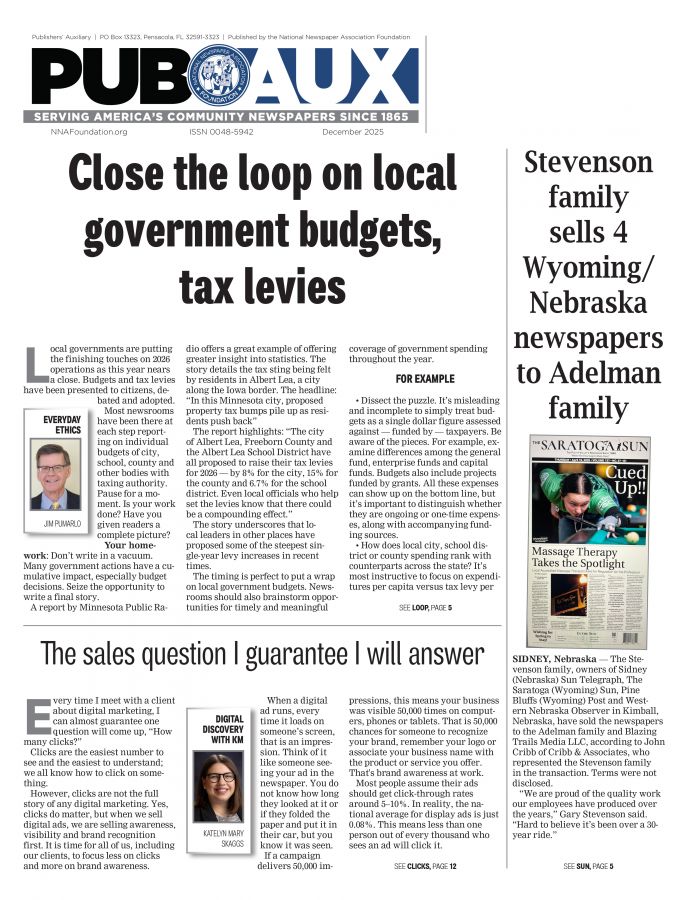Being a leader instead of just a boss
Chip Hutcheson
Aug 1, 2024


This month’s Pub Aux theme, Human Resources, might have you scratching your head. That’s because independently owned community newspapers usually don’t have a person on staff whose sole duties involve HR. But there is a remedy for that situation.
Someone who carries multiple responsibilities in the organization might fulfill some HR functions, but the reality is this — the person responsible for supplying skills or knowledge to help an organization achieve its goals is the owner or publisher or editor, depending on your newspaper’s staffing chart. Effective leadership must be present.
Leadership guru John Maxwell says, “Everything rises and falls on leadership.” Leadership creates the culture in the workplace. Poor leadership results in employees having to tiptoe through a minefield of uncertainty and dysfunction.
Without the benefit of a designated HR person, here’s some advice for community newspaper leaders relating to HR needs.
SIX SUGGESTIONS
◆ First, it’s necessary to differentiate a boss from a leader. A boss cares about the work getting done, while a leader cares about the work and the people doing the work. A boss might delegate, while a leader gets involved in the work and urges others to join. A boss gives orders, while a leader listens and follows up with directions.
For maximum effectiveness, newspapers need leaders, not bosses. So we’ll use the “leader” terminology moving forward. To be successful, the leader of the newspaper, by default, must set the path for setting the vision, equipping and motivating the staff. The leader is accountable for helping every person on the team know who they are, what their purpose is, how they are valued and mentoring them to perform at the highest possible level.
◆ The leader must establish the vision and and outline how to meet that vision. That doesn’t mean the leader is autocratic; giving people a voice in fulfilling that vision is important. The leader should speak clearly and passionately about the newspaper’s role in the community, making sure all involved know there is no agenda other than being the heart and soul of the community.
◆ The leader cannot do everything. It takes a solid team, and building that team is the leader’s responsibility. In the hiring process, don’t set arbitrary requirements that would exclude from job consideration someone with a passion for the newspaper and the community. In today’s world, you might not find a reporter who has a college degree or newspaper experience. You may find someone with strong writing and people skills and a passion for the community, and that person could be a much better fit than someone who has no ties to your community.
◆ The leader must be a mentor. After graduating from college and being immediately hired as a sports editor for a daily newspaper, I soon realized that my education was just beginning. I was blessed to have veteran journalists on the paper’s staff who taught me more than I could ever learn in a classroom. Some of those lessons learned have enabled me to mentor younger journalists over the years.
◆ The leader must care more for team members than just their job performance. As a publisher, it took me years to learn to exhibit grace to employees who needed to be out of the office for family situations. Thirty years ago, when an employee’s daughter was having her first child, my consistent question was, “When will you be back in the office?” Over time, I learned that allowing staff members to take the needed time for family matters paid off handsomely — not only in performance when they returned to work, but also in loyalty to the newspaper. They weren’t looking to go elsewhere and relished the job they had where people genuinely cared about them and their situations in life.
◆ The leader will face confrontation — no one likes it, but be prepared for it. The biggest challenge is not delaying the confrontation. Delay only makes things worse for both parties. Do your homework and get the facts before you confront. One mentor told me, “Bad information leads to unnecessary scars.”
Be a good listener. Your knowledge of the situation could change when you have listened to information from the other party. Also, consider possible reactions, responses and goals ahead of time. It’s wise to think through a response rather than react on the fly.
Ask more questions than you make statements. Work toward a stated solution. Even if you have to be critical of the employee, state that you value them and want to move forward. Don’t hold a grudge. If possible, refocus the employee rather than removing the person from the staff.
SOME SECONDARY SUGGESTIONS
◆ Put down your phone when talking with anyone on your staff. When a co-worker wants to talk with you, don’t disrespect them by giving priority to calls or texts to your phone. I’ve been in situations when someone would continually check their phone when I wanted to have a meaningful conversation. It’s rude to have someone right in front of you who wants to talk and you keep looking at your phone. It is frustrating, to say the least!
Another benefit is that you listen better if you are not focused on your phone. Many have fallen into the trap of thinking answering a call or text is the most important thing they can do.
◆ Encourage your staff to take their allotted vacations, holidays and days off. You are not exempt from that advice.
In my first 16 years as a publisher, I worked every Monday and every Tuesday. My family would leave for vacation, then after the paper was printed and delivered on Wednesday, there’d be a flight to catch to join them, then we’d drive back home on the weekend.
However, in our children’s teenage years, that changed. A week–long vacation made for a much better family situation and provided the refresher that caused me to understand how vital it is to have time away from the office.
Consider time off being a reset. There is time to reflect on your overall mission at the newspaper. While you don’t want to be solely focused on work during your time away, it does allow for time to look at the overall functioning of the paper and consider ways it can be improved or function more efficiently. It also provides time to relax and read; you can be energized for your work by reading books that stimulate and cause reflection on what you do and why you do it.
◆ Finally, know what you don’t know. If there are employee questions and issues arise that an HR expert could easily address, understand that you might not have all the answers. Ask someone who does. For HR issues, that could mean contacting an insurance agency in your community regarding health plans, or it might be contacting a local company large enough to have a designated HR person. That could be an industry, a hospital or the school system. Widen your net — create relationships that will be mutually beneficial. Be available to help others with their communication questions, and they’ll likewise be available to you.
Of course, there’s help available from your state press association, as well as the NNA. In my 41 years as a publisher, Kentucky Press Association and NNA gatherings served as great learning and motivational opportunities. You’ll benefit greatly from those relationships — and be an asset to other publishers who might be facing a problem you have dealt with in the past.
The bottom line is we are better together. There’s assistance available. Don’t hesitate to ask for it.
Chip Hutcheson is the retired publisher of The Times Leader in Princeton, Kentucky. He was NNA president in 2015. He currently serves as a content strategist for Kentucky Today, the online news website of the Kentucky Baptist Convention. chiphutcheson@yahoo.com










